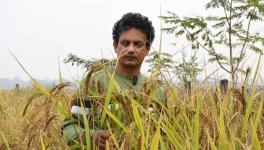Bengal: The Decline of Agri Cooperatives in Bankura
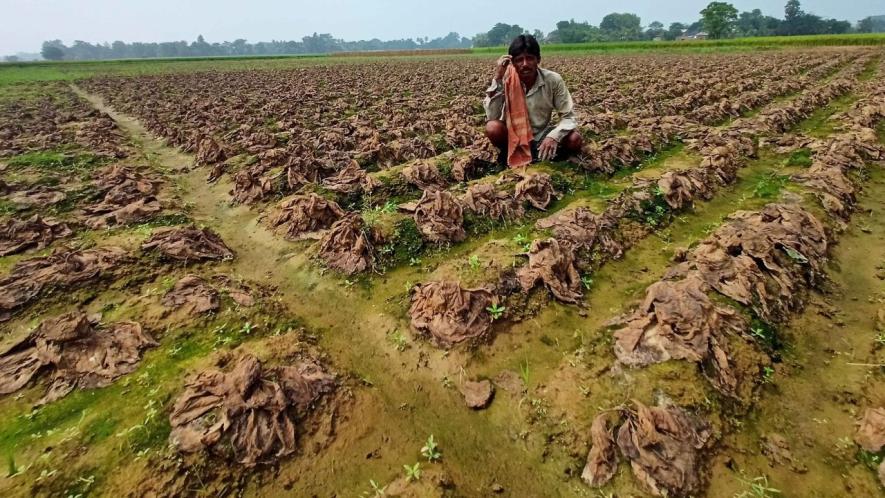
Farmer Jagannath Ghose at Narayanpur village under Patrasayer Block has not received insurance money, despite his cauliflower crop destroyed by hailstorm.
Facing adverse weather conditions, lack of rain at critical times of cultivation, insufficient irrigation systems, skyrocketing prices of fertilisers, pesticides, and seeds, as well as weak agricultural cooperatives that are either defunct or barely surviving, lakhs of farmers in Bankura district of West Bengal’s Jangal Mahal have started cultivating Aman paddy.
They have started growing Aman paddy knowing the significant financial and mental risks with the aim of providing foodgrain for the people.
Agricultural cooperative societies once played a crucial role in addressing such situations, but many of them have closed down due to corruption or a lack of interest from the state government. Consequently, farmers are losing faith in cooperatives.
The West Bengal government has not taken any meaningful initiative to revive these agricultural cooperatives. As a result, farmers are forced farm by borrowing cash, fertilisers, and other cultivation essentials from microfinance companies and local aaratdars (middlemen) at high interest rates.
After harvest, the paddy is delivered from the field to the middlemen’s houses, where farmers do not receive minimum prices for their produce. This situation forces them to take further loans from middlemen to support their families, as the educated young males and females of farmer households are unemployed.
A decade ago, farmers did not face such terrible conditions. Why must the annadatas (farmers), who provide food to people, be made to surrender to the mahajans (middlemen)?
Agricultural Cooperative Societies a Decade Ago
The economy of Jangal Mahal in Bankura district is primarily based on agriculture, with Aman paddy being the main crop cultivated during the Kharif season. The district has 380,000 hectares of land designated for Aman cultivation, although not all of it is utilised. Approximately 300,000 hectares are cultivated by farmers, sharecroppers, and pattadars (those with permanent land settlements).
Farm labourers planting Aman paddy at Barut Bankura 1 block.
The Damodar Valley Corporation (DVC) and Kangsaboti are the two major irrigation systems in the district. However, irrigation water from these systems reaches only a small portion of the land, leaving most cultivation dependent on rainwater.
Before the Left Front government came to power in 1977, more than half of the district's land lay uncultivated, leading to severe food shortage, former sabhadhipati (chief) of Bankura ZillaParishad, Jyansankar Mitra told this reporter.
After the Left Front government took office, the Land Reform Act was seriously implemented. Surplus land was distributed to poor and marginalized villagers as pattas. Sharecroppers were registered in government records. The panchayat initiated multipurpose plans to cultivate long-fallow land, and small irrigation projects were started.
The cooperative system was strengthened, and several Primary Agriculture Cooperative Societies (PACS) were created. These cooperatives provided financial support to farmers, with government funding them. As a result, the village middleman, or gramin mahajan, was almost decimated. Farmers received loans from cooperatives during the Rabi, Boro, and Aman cultivation seasons at nominal interest rates.
The most significant aspect was that these cooperatives were formed by local farmers and farm labourers. Their management committees were elected periodically, fostering a sincere relationship between the cooperatives and the farmers.
"We had developed a family-like relationship with the cooperative societies. They conducted regular health check-ups for farmers and their families and supported the education of farmers' children. Cultural programmes were organised in the villages, and participants were rewarded by PACS. Overall, PACS functioned as guardians," said Madhab Mandal, a farmer from Tilabony village in Hirbandh Block; Jayanto Aatha from Salboni village in Bankura Block 2; Nasiruddin Midya at Kamargore village under Sonamukhi Block and Mangal Das, a sharecropper from Betalon in Indas Block.
The farmers said the erstwhile PACS also brought in agricultural experts to train farmers, increase crop production and introduce new aspects of alternative farming. As a result, farmers in Raipur began soybean cultivation over a vast area, while a large number of farmers in Sonamukhi, Barjora, Indas, Patrasayer, Bishnupur, and Taldangra began almond cultivation. Additionally, farmers in the Manachar area of Barjora started strawberry cultivation.
“Bankura district had 398 PACS during the Left Front regime until 2011. The Bankura District Central Cooperative Bank (BDCC) oversaw these PACS, with the State Cooperative Bank providing funds as loans. Regular meetings were held with the farmers and members of the management committee, as well as directors and officers of BDCC Bank, who frequently met farmers to listen to their opinions and suggestions,” Asit Sharma, former Vice Chairman of Bankura BDCC Bank, told this reporter.
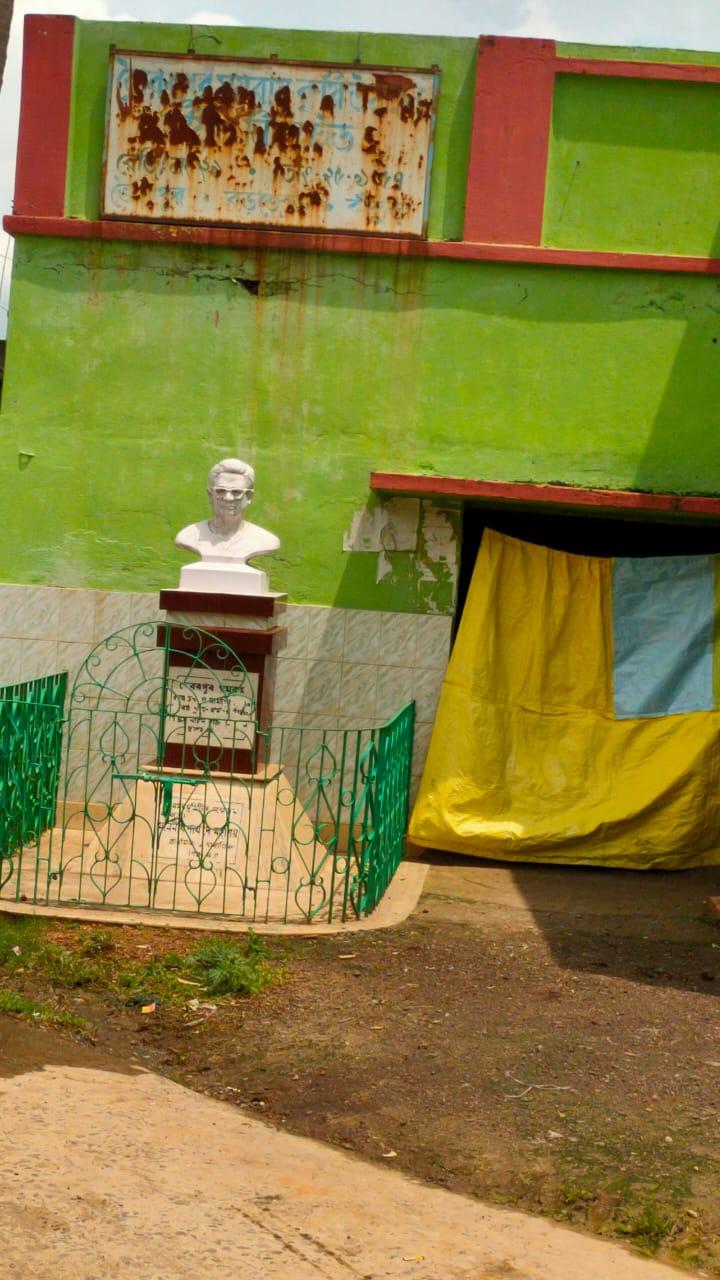
Corruption investigation is underway against Bhairabpur Krishi Unnoyon Somabai Samity.
Sharma said those days farmers were given loans at 7% interest rate and received a 3% interest subsidy if they repaid within a specified period. Fertilisers from the Indian Farmers Fertiliser Cooperative (IFFCO) were supplied at fair prices through cooperatives. Numerous women's self-help groups were formed to support independent earning, he added.
Ashoke Mandal, former director of BDCC Bank, said in addition to farmers, farm labourers were also given loans for small businesses. Notably, water reservoirs were constructed in several drought-prone areas, including Raipur, Hirbandh, Bankura, Kalpathar village, Indpur, Chhatna, and Saltora, funded by BDCC Bank. He said those days farmers had a 100% loan repayment rate. In 2011, 96,000 farmers took loans from these PACS. During that financial year, farmers received loans totalling Rs 151 crore for the Kharif, Boro, and Rabi seasons.
How much do farmers trust cooperatives now?
Soon after the Trinamool Congress came to power in 2011, all elected PACS, including the BDCC management committee, were “forcibly” taken over, said some local residents, alleging that ruling party leaders and activists began running these cooperatives. Since then, no elections have been held in cooperative societies for a decade.
“It turned out that those who took over the cooperatives by force of political power had nothing to do with farmers. Practically, it became a political centre for local TMC leaders and activists,” alleged Tarun Raj, district secretary of Paschimbanga Samabay Banchao Mancha, Bankura district committee. He said most of the societies came to be run by people with no connection to agriculture. Farmers were puzzled by their activities. In this new situation, corruption began to infiltrate the cooperatives, he added.
The first case of corruption came to light in 2014. At that time, BDCC Bank allegedly directly paid Rs 15 crore to a broker in Purba Medinipur, who was loyal to TMC, to buy financial bonds. However, no bonds were bought with that money, and all the money was looted. It is alleged that the bank management, some bank officers, and a Member of the Legislative Assembly (MLA) from Bankura were involved in this corruption. Almost two years later, the bank authorities filed an FIR against the broker. Even though the broker was arrested, the missing money has not been recovered to date.
After this, corruption was reported in several PACS in Bankura district. For example, Katasi Krishi Samabay Samity was allegedly involved a Rs 16 crore scam, Sihar Society in Kotulpur Block Rs 6 crore, Bhairabpur in Barjora Block Rs 7 crore, Andharia Society under Sarenga Block, and Jagannathpur of Joypur Block Rs 6 crore. Even though the administration has launched investigations into these cases , the “known” culprits, allegedly activists and leaders of the ruling party, were not punished.
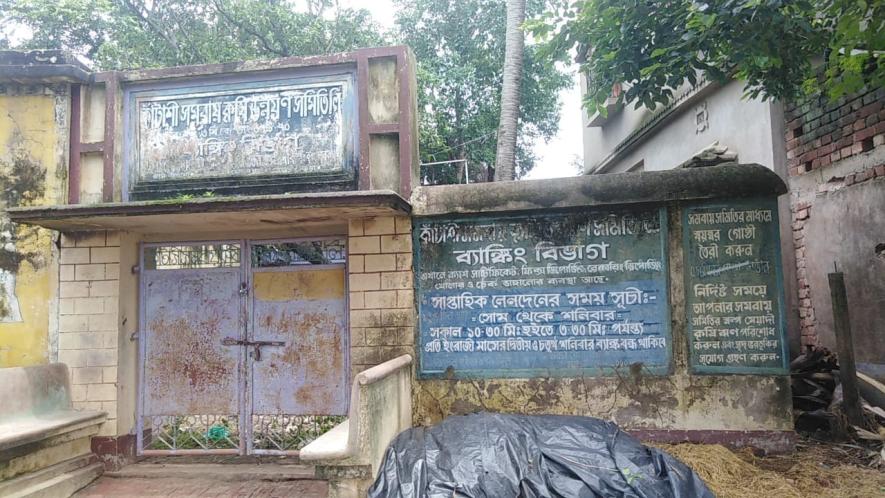
Defunct office of the Katasi Krishi Samabai Unnoyon Samity under Kotulpur Block. A corruption allegation investigation is underway against this society.
Following these alleged corruption cases, the state government dissolved all PACS management boards, and the societies are now being run by government nominees. Interestingly, those appointed as administrators are also leaders and activists of the ruling party.
"We have lost faith in cooperative societies. The cases of corruption show that farmers who took loans in the Kharif season were illegally shown as loan recipients again in the Rabi and Boro seasons," Swapan Ghosh, a farmer from Madanmohanpur in Kotulpur, Asim Das from Indas, Kalyan Ray from Joypur, and Bidyut Raj from Bhairabpur in Barjora, told this reporter.
Moreover, the subsidy money for women's self-help groups was also looted in several PACS, including Bhairabpur KrishiSamabay Samity, they alleged.
During the Left Front government, there were 398 PACS in the district. Now, there are 165.
Various complications are being created in giving loans to farmers, Jadunath Ray, secretary of Sarabharat Krishak Sabha, Bankura District Committee, told this reporter. He reiterated that many farmers have their land in the name of their father or grandfather. In such cases, the farmer is not eligible for a loan. Additionally, the 3% interest subsidy that the farmer is supposed to get if the loan is repaid on time has not been received for several years. Most cooperatives have stopped providing IFFCO fertiliser, seeds, etc. As a result, where 96,000 farmers took loans in Bankura district in 2011, now only 73,000 receive loans. The loan amount is also low. Until June 30, 2024, farmers received only Rs 21 crore rupee as loans from PACS.
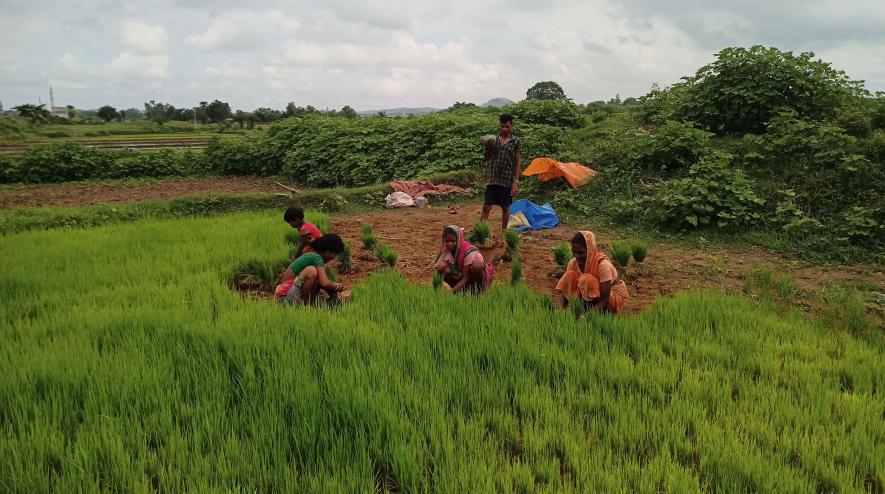
Women labourers collecting seedlings from the seed bed at Holutkanali, Ranibandh.
A retired BDCC Bank officer, who wished to remain anonymous, said the state government has taken no initiative to revive cooperative societies. Employees working in PACS receive Rs 2,000-4,000 per month as salaries, while many work for as low as Rs 700 a month.
Several PACS employees this reporter spoke with, confirmed these claims. They said the state government was supposed to pay them Rs 2,000 a month, but they had not received this money for three years. They said they had lost enthusiasm for work and were struggling to support their families.
Farmers said they also do not receive compensation announced under Banglar Shosyo Bima (Crop Insurance for Natural Calamities), which is determined by satellite images. It is alleged that the insurance company concerned, operates at its own discretion. Jagannath Ghose, a farmer from Narayanpur under Patrasayer Block, alleged that his cauliflowers were destroyed by an untimely hailstorm in January this year, yet he did not receive any insurance money.
The same issue occurred in Taldangra, Simlapal, Raipur, Sonamukhi, and Indas. Farmers said that each year, a new insurance company is given this responsibility, and those in charge previously avoid accountability. In this regard, the current cooperative societies did not support farmers, they added.
Regarding the condition of cooperative societies in this district, the Deputy Registrar of Cooperative Societies, Sagar Sannal, said that audits had started in these societies, and initiatives were being taken to revive the defunct societies. Elections will begin soon in the PACS, he added.
Concerning insurance, Sannal said the matter was being handled by the agriculture department. On the other side, District Agriculture Officer Narayan Mondal said that everything was being done through satellite images, and the agriculture department had no control over it.
The writer covers the Jangalmahal region for ‘Ganashakti’ newspaper in West Bengal.
(All pictures taken by Madhu Sudan Chatterjee)
Get the latest reports & analysis with people's perspective on Protests, movements & deep analytical videos, discussions of the current affairs in your Telegram app. Subscribe to NewsClick's Telegram channel & get Real-Time updates on stories, as they get published on our website.














